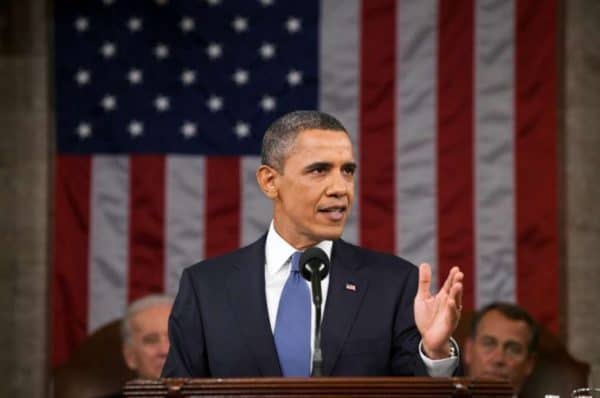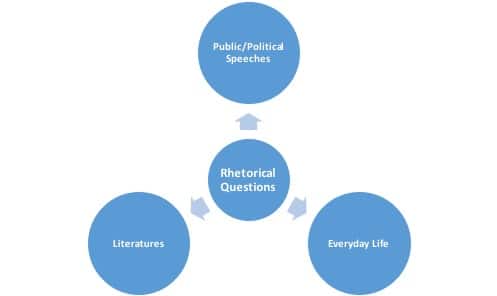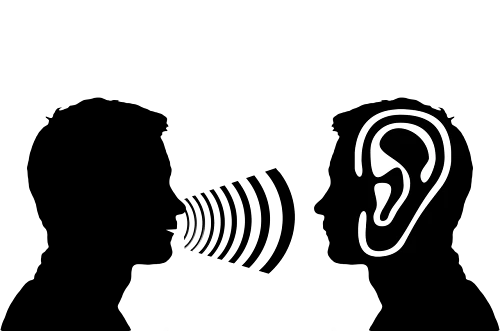Rhetorical Questions Definition: 3 Types and Examples
Most often than not, an answer is usually regarded as the complementary part of a question, and both are generally said to go hand-in-hand.
But when it comes to rhetorical questions, the rule seems different, especially as no answer is required when a rhetorical question is asked. So, what then is a rhetorical question, you may ask.
Rhetorical Question Definition | Meaning
A rhetorical question, also known as erotema, interrogatio, or even erotesis, is a question that is asked without the intention of getting an answer. Instead, a rhetorical question is asked to emphasize a point by a speaker or writer.
More so, since a rhetorical question doesn’t necessarily require an answer, they are most often used as a way of evoking thoughts and understanding from the reader or listener.
Although the definition of a rhetorical question is always the same, rhetorical questions usually take different approaches to achieve its goal on the listener or reader.
Related Article:
20 Public Speaking Techniques Everyone Should Know
Public Speaking: 7 Components of Speech & Tips for Effective Delivery
For instance, some rhetorical questions have an obvious answer, and in such a situation, they are used as a tool to emphasize how glaring the answer to a question is. Here is a good example.
If Jane asked Julie “Do you enjoy working from home?” and Julie definitely enjoys working from home, she might respond by saying “Is the sky blue?”
As mentioned earlier, rhetorical questions are purely questions that don’t demand an answer. But in a situation where the listener or reader tries to give an answer to a rhetorical question, such an answer might sound somewhat weird and off. Here is a good example
“Want to order ice cream?” Rather than respond by saying, “yeah,” you may ask a rhetorical question, “Sure, why not?” Imagine if the next person responds by trying to explain why you shouldn’t order ice cream, you might suspect that they didn’t get your point from your answer, which was a rhetorical question.
Common Examples of Rhetorical Questions
- “How many times do I have to tell you not to eat my dessert?”
- “What’s the matter with kids today?”
- “Is this supposed to be some kind of a joke?”
- “Are you kidding me?”
- “How should I know?”
- “Why me?”
- “Who cares?”
-
8 THINGS YOU CAN DO TO ACE ANY JOB INTERVIEW

The happiness when receiving a call marking the job interview gives rise to endless anxiety. After all, it’s only a few minutes to prove your worth, impress the recruiter and seize the opportunity. However, to do well at the job interview, you need to think about what you will say, how you will present yourself,…
-
An Easy Guide to All 15 Types of Speech

We keep learning that there are three types of speeches, informative speeches, persuasive speeches and special occasion speeches. However, I believe and know that there are many more such as debates, motivational speeches, forensic speeches, impromptu speeches, eulogy, and so on. Here’s a growing list of over 13 types of speech and tips on how…
3 Types Of Rhetorical Questions
There are various types of rhetorical questions, and each type is used specifically to evoke a unique kind of thought to the listener or reader. Here are some common types of rhetorical questions
1. Anthypophora or Hypophora
Anthypophora is a type of rhetorical question in which the speaker addresses a question himself and immediately gives an answer to the question.
According to the Dictionary of Poetic Terms (2003), Jack Myers and Don Charles Wukasch classify anthypophora as a “figure of argumentation whereby the speaker acts as his foil by arguing with himself.”
Etymology
Anthypophora originates from the Greek words, “against” + “allegation.”
Example of Speeches Conveying Apothypophora
Example 1:
“You ask, what is our policy? I will say it is to wage war, by sea, land, and air, with all our might and all the strength that God can give us; to wage war against a monstrous tyranny, never surpassed in the dark, lamentable catalogue of human crime. That is our policy. You ask, what is our aim? I can answer in one word: Victory. Victory at all costs, victory in spite of all terror; victory, however long and hard the road may be, for, without victory, there is no survival.”
Winston Churchill
Example 2
“This is our first task, caring for our children. It’s our first job. If we don’t get that right, we don’t get anything right. That’s how, as a society, we will be judged. And by that measure, can we truly say, as a nation, that we’re meeting our obligations? Can we honestly say that we’re doing enough to keep our children, all of them, safe from harm? Can we claim, as a nation, that we’re all together there, letting them know they are loved and teaching them to love in return? Can we say that we’re truly doing enough to give all the children of this country the chance they deserve to live out their lives in happiness and with purpose? I’ve been reflecting on this the last few days, and if we’re honest with ourselves, the answer’s no. We’re not doing enough. And we will have to change.”
Barack Obama
2. Erotesis
Erotesis, which is also known as erotema, eperotesis and interrogation is another type of rhetorical question that conveys a strong or passionate affirmation or denial.
Etymology
Erotesis is From a Greek word, and it depicts an act of “questioning.”
Example of Erotesis by Dr. Martin Luther King Jr.
“Another thing that disturbs me about the American church is that you have a white church and a Negro church. How can segregation exist in the true Body of Christ?”
Martin Luther King, Jr., “Paul’s Letter to American Christians,” 1956
Example Erotesis by Edmund Burke
“Was I an Irishman on that day that I boldly withstood our pride? or on the day that I hung down my head and wept in shame and silence over the humiliation of Great Britain?”
Edmund Burke, Speech to the Electors of Bristol, September 6, 1780
3. Epiplexis or Epitimesis
Epiplexis as rhetoric is usually regarded as an interrogative figure of speech whereby a question or questions are asked as a way of rebuking rather than to evoke answers.
When a speaker uses epiplexis rhetoric, the goal is an attempt to shame or rebuke an opponent or a listener into adopting their own or a particular point of view.
Etymology
Epiplexis is derived from the Greek word which portrays “a rebuke or to strike at”
Example of Epiplexis by Lebanese Prime Minister Found Siniora
“Are we children of a lesser God? Is an Israeli teardrop worth more than a drop of Lebanese blood?”
Lebanese Prime Minister Fouad Siniora, July 2006
Example of Epitimesis by John Irving
“You think what I do is playing God, but you presume you know what God wants. Do you think that’s not playing God?”
John Irving, The Cider House Rules, 1985
Why Do Writers and Speakers Use Rhetorical Questions?
Speechwriters, playwrights, musicians, and authors use rhetorical questions for a couple of reasons:
- To raise doubt
- To challenge the listener
- To emphasize an idea
- To demonstrate that a previously asked question was obvious
Benefits of using Rhetorical Questions
Although rhetorical questions are not a mandatory component of a speech or write up, they can be employed in various ways to achieve different purposes such as to:
- Influence and persuade the audience
- Increase the variety of your presentation
- Make the listeners think about certain topics
- Subtly draw attention and emphasize specific points
- Introduce topics/ideas
- Engage the audience
Examples of Rhetorical Questions in Different Instances

A rhetorical question is one of the best and easiest ways to carry your audience along in your speech. By so doing, you virtually create the environment for them to speak, but instead of speaking out to the hearing of everyone, each person speaks or conceive some thoughts within their mind.
More so, with a rhetorical question, you can quickly pique the interest of your audience while going ahead to emphasize the main points of your discussion or address.
Below are some notable and ageless rhetorical questions in different situations; famous speeches, literature, and even in our everyday life and activities at home, school, office, and just anywhere you can think of.
Rhetorical Questions in Famous Speeches
“Can anyone look at the record of this Administration and say, “Well done”?
Can anyone compare the state of our economy when the Carter Administration took office with where we are today and say, “Keep up the good work”?
Can anyone look at our reduced standing in the world today and say, “Let’s have four more years of this”?
-Jimmy Carter-
“Look at me! Look at my arm! I have ploughed and planted and gathered into barns, and no man could head me! And ain’t I a woman? I could work as much and eat as much as a man – when I could get it – and bear the lash as well! And ain’t I a woman? I have borne thirteen children and seen most all sold off to slavery, and when I cried out with my mother’s grief, none but Jesus heard me! And ain’t I a woman?”
-Sojourner Truth-
“Are we a nation that tolerates the hypocrisy of a system where workers who pick our fruit and make our beds never have a chance to get right with the law? Are we a nation that accepts the cruelty of ripping children from their parents’ arms? Or are we a nation that values families, and works to keep them together?”
-Barack Obama-
Rhetorical Questions in Literatures
Prolific writers have a way of prompting further reflection and thinking from their readers, and they achieve this through the use of rhetorical questions.
By leaving some hanging questions in this manner, writers create that environment where their readers can spend more time in contemplation.
“If you prick us, do we not bleed?
If you tickle us, do we not laugh?
If you poison us, do we not die?
And if you wrong us, shall we not revenge?”
-William Shakespeare-
“…O Wind, if Winter comes, can Spring be far behind?”
-Percy Bysshe Shelley-
“What happens to a dream deferred?
Does it dry up like a raisin in the sun?
Or fester like a sore and then run?
Does it stink like rotten meat?
Or crust and sugar over like a syrupy sweet?”
-Langston Hughes-
“What’s in a name? That which we call a rose by any other name would smell as sweet!”
-William Shakespeare-
Examples of Rhetorical Questions in Everyday Life
One good and outstanding thing about rhetorical questions is the fact that they are not only limited to literature or political speeches. They can be used in anywhere, especially where there a conversation between two or more people.
When in a conversation with someone or a group of people, making your point using a rhetorical question is more striking and drives more meaning than making a mere flat statement.
Here are some rhetorical questions in everyday life conversations. Sure, you’ll find some you’ve used in the past or just recently even without knowing.
A father arguing with his son about the importance of making good grades in school, the father may say, “Are you prepared to live here in the basement for the rest of your life?” With such rhetoric, the father expects that the son will realize that making good grades is one way to get a better-paying job, which will ultimately make him live a better life.
Maybe during a conversation with your wife, she pops the unexpected question – if you love her. You may say, “Is the pope Catholic?” With this rhetoric, you have given her more than just an answer that you love her, just as it is a glaring fact that the leader of the Catholic should be a Catholic.
A wife came home from the hospital to show her husband her pregnancy test result, which shows that she is pregnant. The husband responds, “Are you serious?”. The rhetoric, in this case, emphasizes the amazement of the husband at the news.
A child asking for an expensive gadget from the father, and the father responded by saying “Do you think that money just grows on trees?” This question from the father is a way of igniting the consciousness of how difficult it is to pay for everything the child is enjoying.
Conclusion
Rhetorical questions are questions that do not necessarily require an answer from the listener or audience. They are used to emphasize points and major ideas in a speech or conversation.
Using rhetoric instead of a flat statement in response to a question or conversation persuades and influences the audience’s perception, allows the listeners to think just beyond what they are hearing, and it also works perfectly in engaging an audience.
References
- http://www.literarydevices.com/rhetorical-question/
- https://examples.yourdictionary.com/rhetorical-question-examples.html
- https://virtualspeech.com/blog/rhetorical-questions-speech-examples
- https://www.thoughtco.com/rhetorical-question-grammar-1692060
- https://ifioque.com/figures-of-speech/trope/anthypophora
- https://literaryterms.net/rhetorical-question/
- https://www.thoughtco.com/what-is-a-rhetorical-question-1691877









